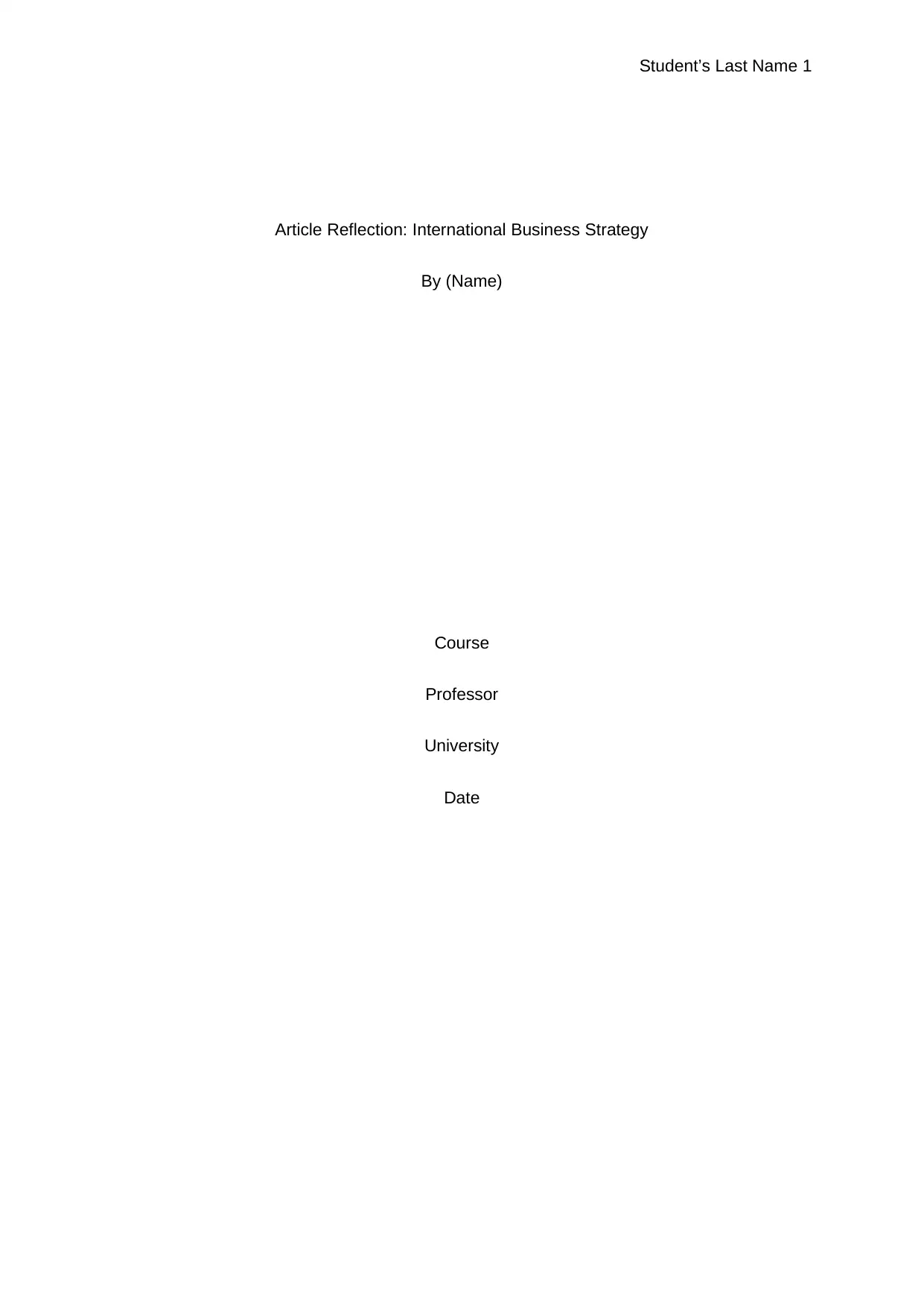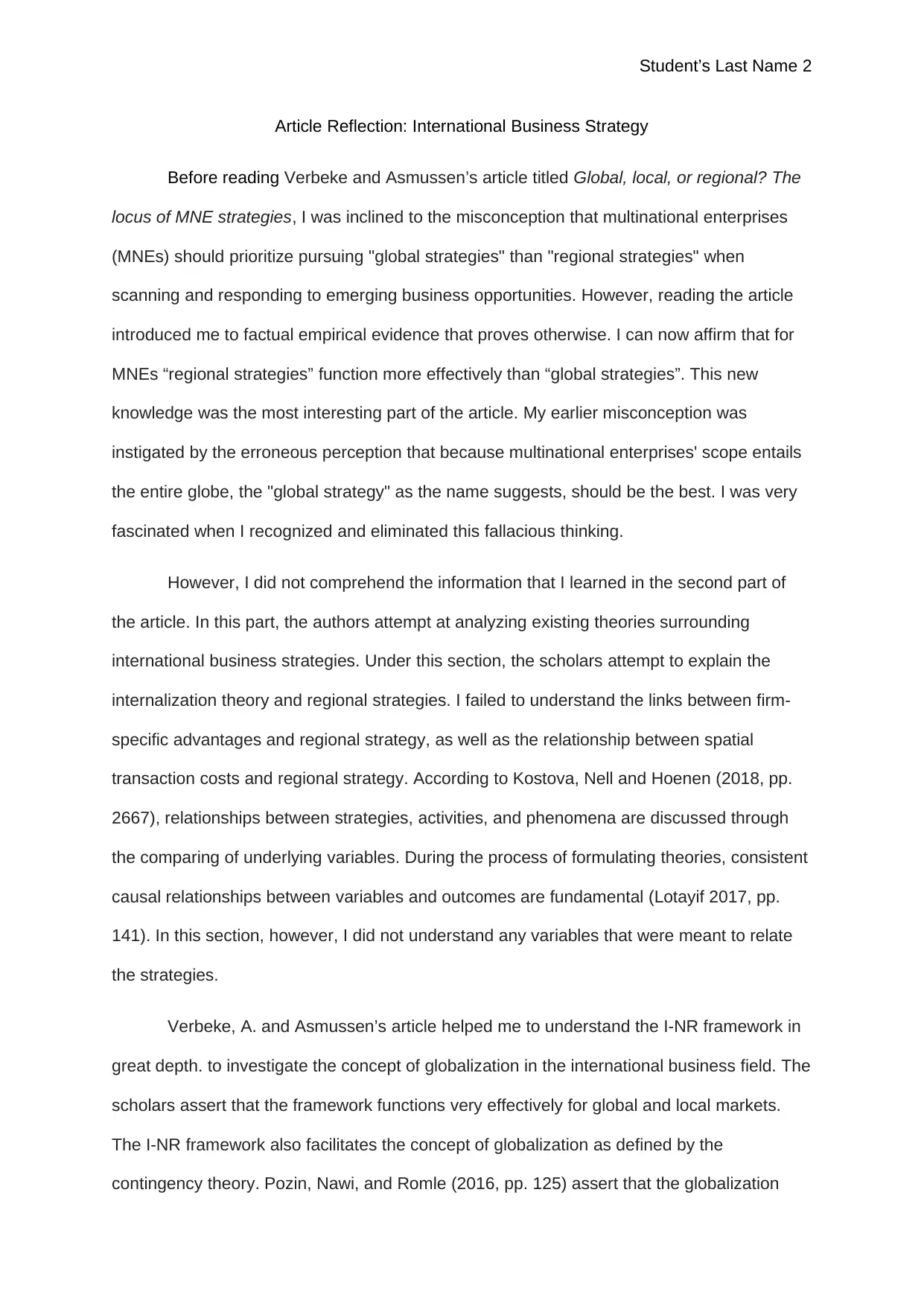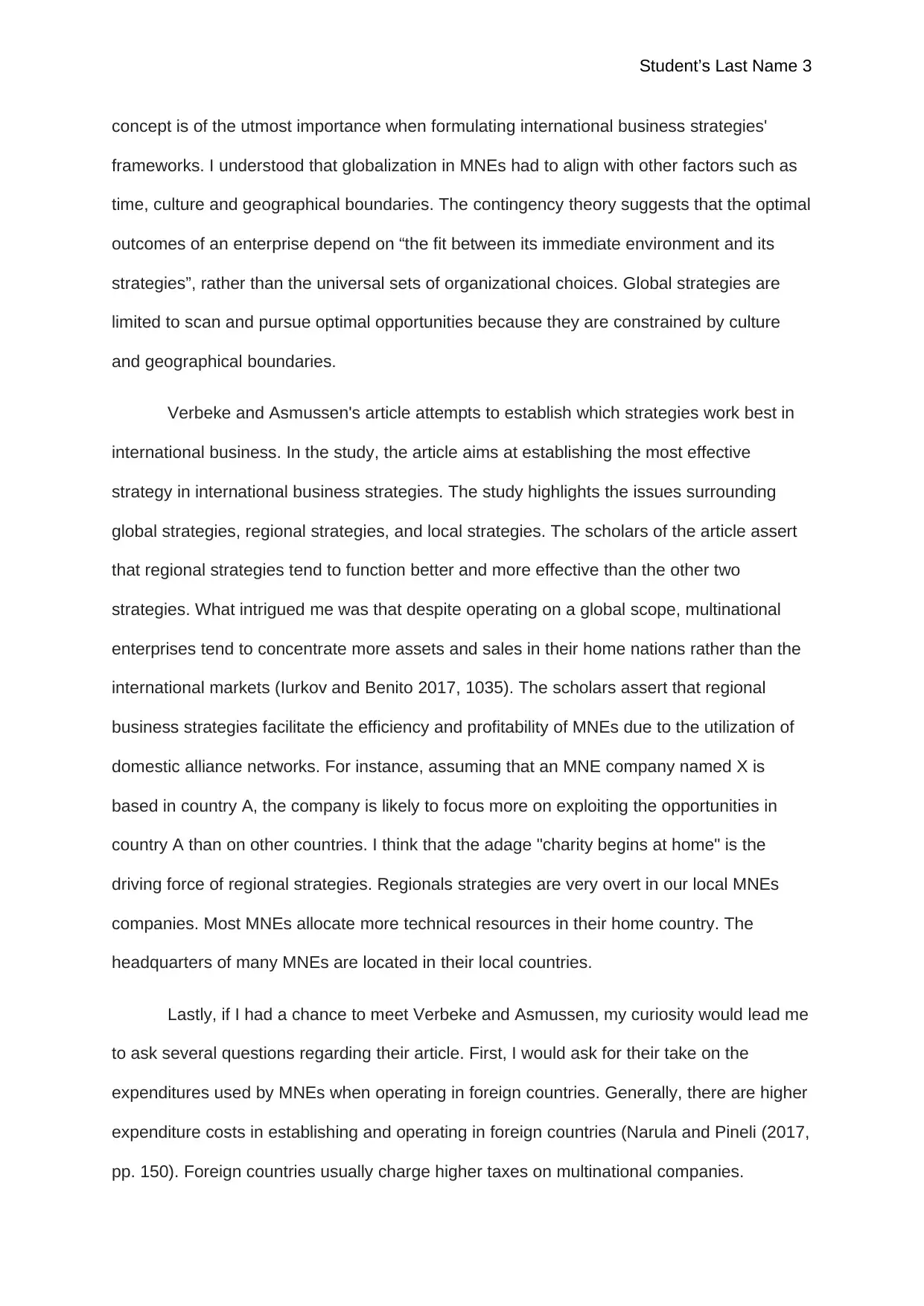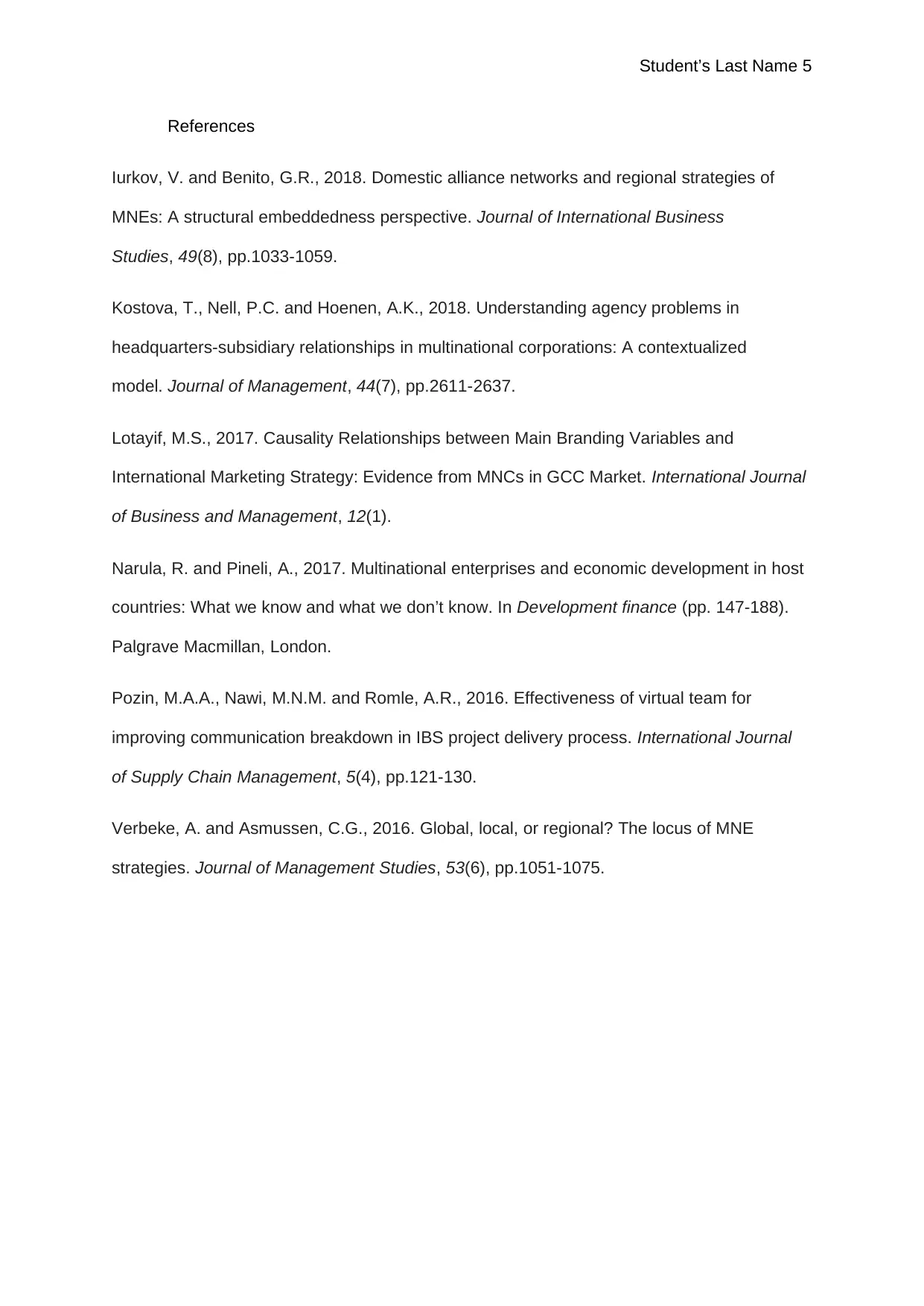Article Reflection: International Business Strategy by [Student Name]
VerifiedAdded on 2022/09/12
|5
|1121
|15
Report
AI Summary
This report is a student's reflection on the article "Global, local, or regional? The locus of MNE strategies" by Verbeke and Asmussen. The student initially believed in global strategies but was convinced by the article that regional strategies are more effective for multinational enterprises (MNEs). The student found the discussion of the I-NR framework and its application to globalization insightful, understanding that globalization in MNEs must align with time, culture, and geographical boundaries, as suggested by the contingency theory. The student also discusses the importance of regional strategies, highlighting that MNEs often focus more on their home countries, and proposes questions for the authors about expenditures and the links between firm-specific advantages and regional strategy. The reflection incorporates references to relevant literature to support the arguments presented.

Student’s Last Name 1
Article Reflection: International Business Strategy
By (Name)
Course
Professor
University
Date
Article Reflection: International Business Strategy
By (Name)
Course
Professor
University
Date
Paraphrase This Document
Need a fresh take? Get an instant paraphrase of this document with our AI Paraphraser

Student’s Last Name 2
Article Reflection: International Business Strategy
Before reading Verbeke and Asmussen’s article titled Global, local, or regional? The
locus of MNE strategies, I was inclined to the misconception that multinational enterprises
(MNEs) should prioritize pursuing "global strategies" than "regional strategies" when
scanning and responding to emerging business opportunities. However, reading the article
introduced me to factual empirical evidence that proves otherwise. I can now affirm that for
MNEs “regional strategies” function more effectively than “global strategies”. This new
knowledge was the most interesting part of the article. My earlier misconception was
instigated by the erroneous perception that because multinational enterprises' scope entails
the entire globe, the "global strategy" as the name suggests, should be the best. I was very
fascinated when I recognized and eliminated this fallacious thinking.
However, I did not comprehend the information that I learned in the second part of
the article. In this part, the authors attempt at analyzing existing theories surrounding
international business strategies. Under this section, the scholars attempt to explain the
internalization theory and regional strategies. I failed to understand the links between firm-
specific advantages and regional strategy, as well as the relationship between spatial
transaction costs and regional strategy. According to Kostova, Nell and Hoenen (2018, pp.
2667), relationships between strategies, activities, and phenomena are discussed through
the comparing of underlying variables. During the process of formulating theories, consistent
causal relationships between variables and outcomes are fundamental (Lotayif 2017, pp.
141). In this section, however, I did not understand any variables that were meant to relate
the strategies.
Verbeke, A. and Asmussen’s article helped me to understand the I-NR framework in
great depth. to investigate the concept of globalization in the international business field. The
scholars assert that the framework functions very effectively for global and local markets.
The I-NR framework also facilitates the concept of globalization as defined by the
contingency theory. Pozin, Nawi, and Romle (2016, pp. 125) assert that the globalization
Article Reflection: International Business Strategy
Before reading Verbeke and Asmussen’s article titled Global, local, or regional? The
locus of MNE strategies, I was inclined to the misconception that multinational enterprises
(MNEs) should prioritize pursuing "global strategies" than "regional strategies" when
scanning and responding to emerging business opportunities. However, reading the article
introduced me to factual empirical evidence that proves otherwise. I can now affirm that for
MNEs “regional strategies” function more effectively than “global strategies”. This new
knowledge was the most interesting part of the article. My earlier misconception was
instigated by the erroneous perception that because multinational enterprises' scope entails
the entire globe, the "global strategy" as the name suggests, should be the best. I was very
fascinated when I recognized and eliminated this fallacious thinking.
However, I did not comprehend the information that I learned in the second part of
the article. In this part, the authors attempt at analyzing existing theories surrounding
international business strategies. Under this section, the scholars attempt to explain the
internalization theory and regional strategies. I failed to understand the links between firm-
specific advantages and regional strategy, as well as the relationship between spatial
transaction costs and regional strategy. According to Kostova, Nell and Hoenen (2018, pp.
2667), relationships between strategies, activities, and phenomena are discussed through
the comparing of underlying variables. During the process of formulating theories, consistent
causal relationships between variables and outcomes are fundamental (Lotayif 2017, pp.
141). In this section, however, I did not understand any variables that were meant to relate
the strategies.
Verbeke, A. and Asmussen’s article helped me to understand the I-NR framework in
great depth. to investigate the concept of globalization in the international business field. The
scholars assert that the framework functions very effectively for global and local markets.
The I-NR framework also facilitates the concept of globalization as defined by the
contingency theory. Pozin, Nawi, and Romle (2016, pp. 125) assert that the globalization

Student’s Last Name 3
concept is of the utmost importance when formulating international business strategies'
frameworks. I understood that globalization in MNEs had to align with other factors such as
time, culture and geographical boundaries. The contingency theory suggests that the optimal
outcomes of an enterprise depend on “the fit between its immediate environment and its
strategies”, rather than the universal sets of organizational choices. Global strategies are
limited to scan and pursue optimal opportunities because they are constrained by culture
and geographical boundaries.
Verbeke and Asmussen's article attempts to establish which strategies work best in
international business. In the study, the article aims at establishing the most effective
strategy in international business strategies. The study highlights the issues surrounding
global strategies, regional strategies, and local strategies. The scholars of the article assert
that regional strategies tend to function better and more effective than the other two
strategies. What intrigued me was that despite operating on a global scope, multinational
enterprises tend to concentrate more assets and sales in their home nations rather than the
international markets (Iurkov and Benito 2017, 1035). The scholars assert that regional
business strategies facilitate the efficiency and profitability of MNEs due to the utilization of
domestic alliance networks. For instance, assuming that an MNE company named X is
based in country A, the company is likely to focus more on exploiting the opportunities in
country A than on other countries. I think that the adage "charity begins at home" is the
driving force of regional strategies. Regionals strategies are very overt in our local MNEs
companies. Most MNEs allocate more technical resources in their home country. The
headquarters of many MNEs are located in their local countries.
Lastly, if I had a chance to meet Verbeke and Asmussen, my curiosity would lead me
to ask several questions regarding their article. First, I would ask for their take on the
expenditures used by MNEs when operating in foreign countries. Generally, there are higher
expenditure costs in establishing and operating in foreign countries (Narula and Pineli (2017,
pp. 150). Foreign countries usually charge higher taxes on multinational companies.
concept is of the utmost importance when formulating international business strategies'
frameworks. I understood that globalization in MNEs had to align with other factors such as
time, culture and geographical boundaries. The contingency theory suggests that the optimal
outcomes of an enterprise depend on “the fit between its immediate environment and its
strategies”, rather than the universal sets of organizational choices. Global strategies are
limited to scan and pursue optimal opportunities because they are constrained by culture
and geographical boundaries.
Verbeke and Asmussen's article attempts to establish which strategies work best in
international business. In the study, the article aims at establishing the most effective
strategy in international business strategies. The study highlights the issues surrounding
global strategies, regional strategies, and local strategies. The scholars of the article assert
that regional strategies tend to function better and more effective than the other two
strategies. What intrigued me was that despite operating on a global scope, multinational
enterprises tend to concentrate more assets and sales in their home nations rather than the
international markets (Iurkov and Benito 2017, 1035). The scholars assert that regional
business strategies facilitate the efficiency and profitability of MNEs due to the utilization of
domestic alliance networks. For instance, assuming that an MNE company named X is
based in country A, the company is likely to focus more on exploiting the opportunities in
country A than on other countries. I think that the adage "charity begins at home" is the
driving force of regional strategies. Regionals strategies are very overt in our local MNEs
companies. Most MNEs allocate more technical resources in their home country. The
headquarters of many MNEs are located in their local countries.
Lastly, if I had a chance to meet Verbeke and Asmussen, my curiosity would lead me
to ask several questions regarding their article. First, I would ask for their take on the
expenditures used by MNEs when operating in foreign countries. Generally, there are higher
expenditure costs in establishing and operating in foreign countries (Narula and Pineli (2017,
pp. 150). Foreign countries usually charge higher taxes on multinational companies.
⊘ This is a preview!⊘
Do you want full access?
Subscribe today to unlock all pages.

Trusted by 1+ million students worldwide

Student’s Last Name 4
Moreover, activities such as advertising and marketing in foreign countries require heavy
spending. I would use this argument to instigate the author to delve more into the issue of
expenditures by MNEs. Moreover, I would use this platform to explain the links between firm-
specific advantages and regional strategy, as well as the relationship between spatial
transaction costs and regional strategy. I believe that the authors’ oral explanation would
serve to help me understand the concepts.
Moreover, activities such as advertising and marketing in foreign countries require heavy
spending. I would use this argument to instigate the author to delve more into the issue of
expenditures by MNEs. Moreover, I would use this platform to explain the links between firm-
specific advantages and regional strategy, as well as the relationship between spatial
transaction costs and regional strategy. I believe that the authors’ oral explanation would
serve to help me understand the concepts.
Paraphrase This Document
Need a fresh take? Get an instant paraphrase of this document with our AI Paraphraser

Student’s Last Name 5
References
Iurkov, V. and Benito, G.R., 2018. Domestic alliance networks and regional strategies of
MNEs: A structural embeddedness perspective. Journal of International Business
Studies, 49(8), pp.1033-1059.
Kostova, T., Nell, P.C. and Hoenen, A.K., 2018. Understanding agency problems in
headquarters-subsidiary relationships in multinational corporations: A contextualized
model. Journal of Management, 44(7), pp.2611-2637.
Lotayif, M.S., 2017. Causality Relationships between Main Branding Variables and
International Marketing Strategy: Evidence from MNCs in GCC Market. International Journal
of Business and Management, 12(1).
Narula, R. and Pineli, A., 2017. Multinational enterprises and economic development in host
countries: What we know and what we don’t know. In Development finance (pp. 147-188).
Palgrave Macmillan, London.
Pozin, M.A.A., Nawi, M.N.M. and Romle, A.R., 2016. Effectiveness of virtual team for
improving communication breakdown in IBS project delivery process. International Journal
of Supply Chain Management, 5(4), pp.121-130.
Verbeke, A. and Asmussen, C.G., 2016. Global, local, or regional? The locus of MNE
strategies. Journal of Management Studies, 53(6), pp.1051-1075.
References
Iurkov, V. and Benito, G.R., 2018. Domestic alliance networks and regional strategies of
MNEs: A structural embeddedness perspective. Journal of International Business
Studies, 49(8), pp.1033-1059.
Kostova, T., Nell, P.C. and Hoenen, A.K., 2018. Understanding agency problems in
headquarters-subsidiary relationships in multinational corporations: A contextualized
model. Journal of Management, 44(7), pp.2611-2637.
Lotayif, M.S., 2017. Causality Relationships between Main Branding Variables and
International Marketing Strategy: Evidence from MNCs in GCC Market. International Journal
of Business and Management, 12(1).
Narula, R. and Pineli, A., 2017. Multinational enterprises and economic development in host
countries: What we know and what we don’t know. In Development finance (pp. 147-188).
Palgrave Macmillan, London.
Pozin, M.A.A., Nawi, M.N.M. and Romle, A.R., 2016. Effectiveness of virtual team for
improving communication breakdown in IBS project delivery process. International Journal
of Supply Chain Management, 5(4), pp.121-130.
Verbeke, A. and Asmussen, C.G., 2016. Global, local, or regional? The locus of MNE
strategies. Journal of Management Studies, 53(6), pp.1051-1075.
1 out of 5
Your All-in-One AI-Powered Toolkit for Academic Success.
+13062052269
info@desklib.com
Available 24*7 on WhatsApp / Email
![[object Object]](/_next/static/media/star-bottom.7253800d.svg)
Unlock your academic potential
Copyright © 2020–2025 A2Z Services. All Rights Reserved. Developed and managed by ZUCOL.